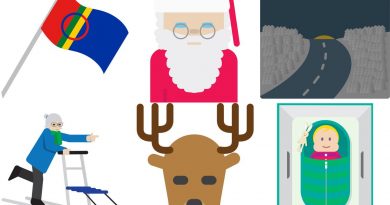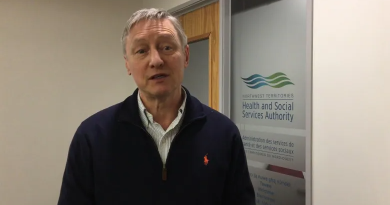Northern Canada: New health centre in Cape Dorset could hold those on suicide watch, inquest hears

Cape Dorset’s new health centre will be the first in Canada’s eastern Arctic territory of Nunavut to have a room that can be used as a “safe room” for someone considered a suicide risk, the jury in a coroner’s inquest heard Wednesday in the community.
The health centre is currently under construction. When complete, it will have a room where equipment can be quickly moved out so a person deemed at risk of suicide can be monitored.
This room would serve as an alternative to the only option that exists now, which is holding an at-risk person in RCMP (federal police) cells.

The inquest is looking into the circumstances surrounding the death of Adla Pudlat, who died in RCMP cells in Cape Dorset on May 20, 2016.
Every witness in the inquest who had interacted with Pudlat on the day he died testified that he died by suicide. The six inquest jurors will confirm how Pudlat died and make recommendations to the RCMP and government on how policies can be improved.
The inquest has focused on coming up with useful recommendations to prevent suicides.
Every witness in the inquest who had interacted with Pudlat on the day he died testified that he died by suicide. The six inquest jurors will confirm how Pudlat died and make recommendations to the RCMP and government on how policies can be improved.
The inquest has focused on coming up with useful recommendations to prevent suicides.
On Wednesday, coroner’s counsel Sheldon Toner, who’s leading the inquest, called witnesses who work in mental health in Nunavut.
Victoria Madsen, the territorial government’s director of mental health and addictions, testified that if “trained observers” can watch at-risk persons at the health centre, it would be preferable to jail cells for those not charged with criminal offences.
Nunavut’s suicide crisis
Pudlat’s death occurred several months after Nunavut declared a suicide crisis in the territory.
Since then, the police and government have made changes to their procedures to reduce the number of suicides.
Those changes include creating an interagency sharing protocol in which the RCMP, the departments of Health, Family Services and Education, and the Nunavut Housing Corporation can share information among themselves.
This protocol means that if someone is “imminently” at risk of suicide, mental health professionals can — without the person’s consent — share their assessment information with police or other relevant departments. They don’t otherwise share the information to protect the privacy of their clients, Madsen said.
Madsen testified that the agencies have talked about opening up that policy further, so information could be shared for individuals “potentially” at risk of suicide.
Several witnesses testified to the value of first responders having that kind of information available to them.

Training for federal police
Madsen and her colleagues with the Embrace Life Council, a not-for-profit organization in Nunavut formed to deal with the suicide crisis, and the Quality of Life Secretariat — a branch of the Department of Health, focused on preventing suicide — also spoke about available training.
The Nunavut government offers or funds several different training programs designed to teach Nunavut-specific cultural competency to employees that come from southern Canada.
It also offers suicide awareness and prevention programs, which are available to government staff, the RCMP and, in some cases, the public.
Embrace Life Council’s executive director, Esther Powell, suggested that all RCMP officers could receive the cultural training — which would include learning about the prevalence of suicide in the territory — before starting work in Nunavut.
Once officers start working in communities, they are often too busy policing to take two days to take the training, she said.
Powell also said that it had been a while since suicide prevention training programs had been run in Cape Dorset, and people in the community would benefit from it.
The inquest continues Thursday.
Where to get help
If you’re worried someone you know may be at risk of suicide, you should talk to them about it, says the Canadian Association for Suicide Prevention.
- Nunavut Kamatsiaqtut Help Line — 1-800-265-3333
- Embrace Life Council
- Kids Help Phone — 1-800-668-6868 or live chat counselling online
- Hope for Wellness Help Line — 1-855-242-3310
- Canada Suicide Prevention Service
- Toll-free 1-833-456-4566
- Text: 45645
- Chat: crisisservicescanada.ca
- In French: Association québécoise de prévention du suicide — 1-866-APPELLE (1-866-277-3553)
- Canadian Association for Suicide Prevention
- Indian Residential School Resolution Health Support Program, Northern Region — 1-800-464-8106
Related stories from around the North:
Canada: Young Nunavik leaders bring stories of hope, loss to youth forum in southern Quebec, CBC News
Finland: Police in Arctic Finland overstretched, says retiring officer, Yle News
United States: Alaska’s suicide rates jump 13 percent, report shows, Alaska Public Media



